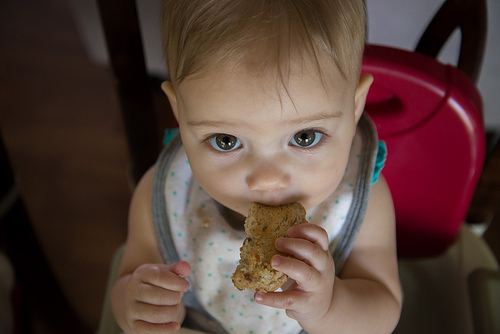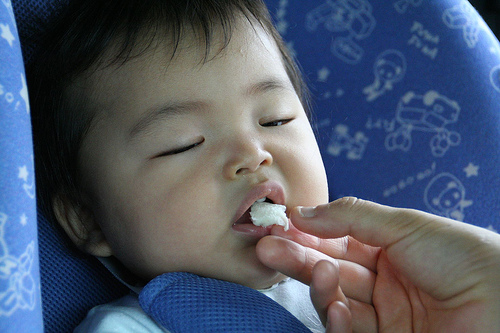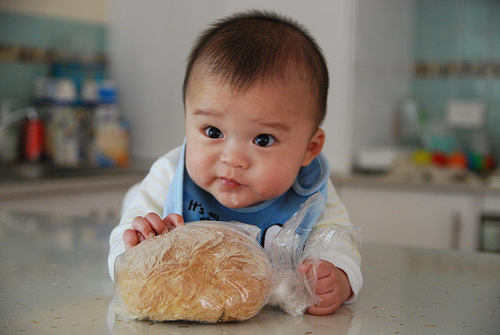Hey new moms and moms-to-be, great news! Scientists have pinpointed the precise moment in your baby’s life when it’s acceptable to introduce gluten to his or her diet.
As long as you administer just the right dose of gluten no earlier or later than 3:42:18 a.m. exactly 126 days after your baby is born, he/she can’t possibly get celiac disease. (We don’t know yet about gluten sensitivity, sorry.) On the other hand, if you jump the gun or miss your cue, Baby is almost guaranteed to develop an autoimmune response to gluten, so get it right.

Don’t mess up, now.
Photo © Donnie Ray Jones | Flickr
Sure, feeding gluten at that time goes against the World Health Organization (WHO)’s suggestion to breastfeed exclusively for six months to protect against gastrointestinal infections, decrease your baby’s chances of becoming obese, increase your baby’s likelihood of school success, and reduce your own risk of ovarian and breast cancer. But WHO are they to tell you what to do? You need to look at the big picture, and introduce gluten while you still can!
Oh, and should you follow the WHO’s other recommendation to continue to breastfeed for up to two years, then you’ll really seal the deal: the study demonstrates that babies who still latch on at age one may also be more likely to come down with a case of the celiac. Bummer!
The point I’m making, ladies, is that it’s up to you to prevent the spread of this celiac epidemic. So whatever you do, don’t focus on what seems right for your child’s and your own individual well-being. Your son wants to gum on a crust before the precise moment when it’s acceptable for him to do so? Tell him no! It’s how kids learn. Your eleven-month-old daughter still thinks breast is best? Wean her fast! Keep in mind that mother knows best, except when science does.
It’s too late to avoid passing your child the celiac genes. But you can make it right by timing it right. When it comes to introducing gluten, you must delay, delay, delay, and then ACT FAST. Keep that bread box stocked, and don’t be caught sleeping at the appointed time. In fact, set your alarm now.

Don’t let Baby be caught sleeping, either.
Photo © Yoshihide Nomura | Flickr
The fate of your child is in your hands (and breasts). Celiac disease prevalence is increasing, and it seems mothers are to blame. Don’t become part of the problem.
If today marks day 127 of Baby’s life, then sorry, you’ve already flubbed it. You can always try again on your next child; science is all about learning from mistakes. Then again, having a sib with celiac disease will pretty much doom any future offspring, too, so you’d better not worry about it too much. After all, when it comes to ruining Baby’s life, getting stressed out is another surefire way.
For more totally-not-overstated headlines about the latest too-small-sample-sized study of a possible celiac risk factor by not-even-completely-convinced-themselves researchers, check out:
- Timing Key When Introducing Gluten to Baby
- Parents’ Feeding Choices May Raise Baby’s Risk for Celiac Disease
- Celiac Disease May Be Preventable in Baby’s Early Months
- Feeding Habits of Parents May Cause Celiac Disease in Children
I’m glad research on causes of celiac disease continues. Still, I think sometimes we get so excited that science is paying attention to us that we give studies more weight than they deserve (even more than the researchers tell us to give them).

Confusing, isn’t it?
Photo © Alpha | Flickr
This was the latest in a patchwork of conflicting, insufficient studies on celiac disease triggers (and on breastfeeding). Most of the articles do include cautions about study limitations and conflicting existing research. But the headlines are pure mommy (sorry, “parent”) guilt.


